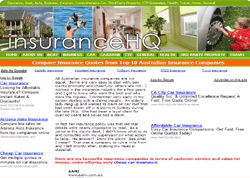3rd Party Car Insurance?
3rd Party Car Insurance?
by: Bruce Gow http://www.insurancehq.com.au
All owners are required by law to insure vehicles driven on public roads. Some provinces and territories offer public insurance while others have insurance sold privately. Here are some basic items to consider when buying vehicle insurance: 3rd Party insurance is mandatory, and is used as financial protection against loss or injury caused to others while operating your vehicle.
The minimum amount of insurance required differs across jurisdictions but keep in mind that skimping on liability insurance may cost you in the long run. Minimum liability will not cover the cost of an accident resulting in the injury of several people, for example, particularly in circumstances where litigation is an option.
Comprehensive insurance, unlike 3rd Party insurance, may be optional. Comprehensive insurance, however, is still recommended for the simple reason that damages to a vehicle will quickly add up in the event of an accident where you are at fault. Not being able to recover any money will have serious ramifications on your bank account.
Some dealers or credit grantors may require that you take out other insurance such as life and/or disability insurance prior to agreeing to do business with you. Make sure that you fully read and understand any agreements that you are asked to sign and that you get a copy of the completed and signed agreement. Do not sign an agreement unless it is completed in full.
You should also do some comparison shopping on insurance prices and coverage prior to signing any agreement. Here are some items to consider in keeping your insurance rates to a minimum:
Accidents can increase your insurance costs, especially when you are at fault. Though it's easier said than done, staying out of accidents will save you money in more ways than one.
Statistics show that some vehicles are more likely than others to be involved in an accident. Insurance companies are aware of this and therefore charge more to insure high-risk vehicles. The make and model of the vehicle, its colour, and whether it's a two-door or four-door are all factors considered by your insurance company. Some cars are also more expensive to repair or are frequently pursued by thieves. Consider how important owning a high-profile vehicle is to you. Contact the Vehicle Information Centre of Canada (www.vicc.com) to find out which vehicles will cost you more to insure.
Where you live may affect what you pay for automobile insurance. Driving to work everyday, especially if it's a long commute, does not only mean extra gas and wear and tear on your vehicle but also the possibility of a higher insurance premium. Urban residents may have higher premiums than those living in rural areas.
Insurance companies reward those who are of low risk to them. Discounts might be offered for driver education, multiple vehicles, high academic achievement, anti-theft devices or abstinence from alcohol, among others. Have your insurance broker inquire about any of these types of discounts.
Sometimes it doesn't pay to be carrying collision or comprehensive insurance on an older vehicle if the total amount you are paying for the deductible plus the monthly premium is more then the entire worth of your vehicle.
For more information regarding auto insurance and other topics on cars and transportation, visit http://www.insurancehq.com.au
